A Thai-American millennial went to Bangkok to find 'real Thai food.' Now, his private supper club has a monthslong waitlist.
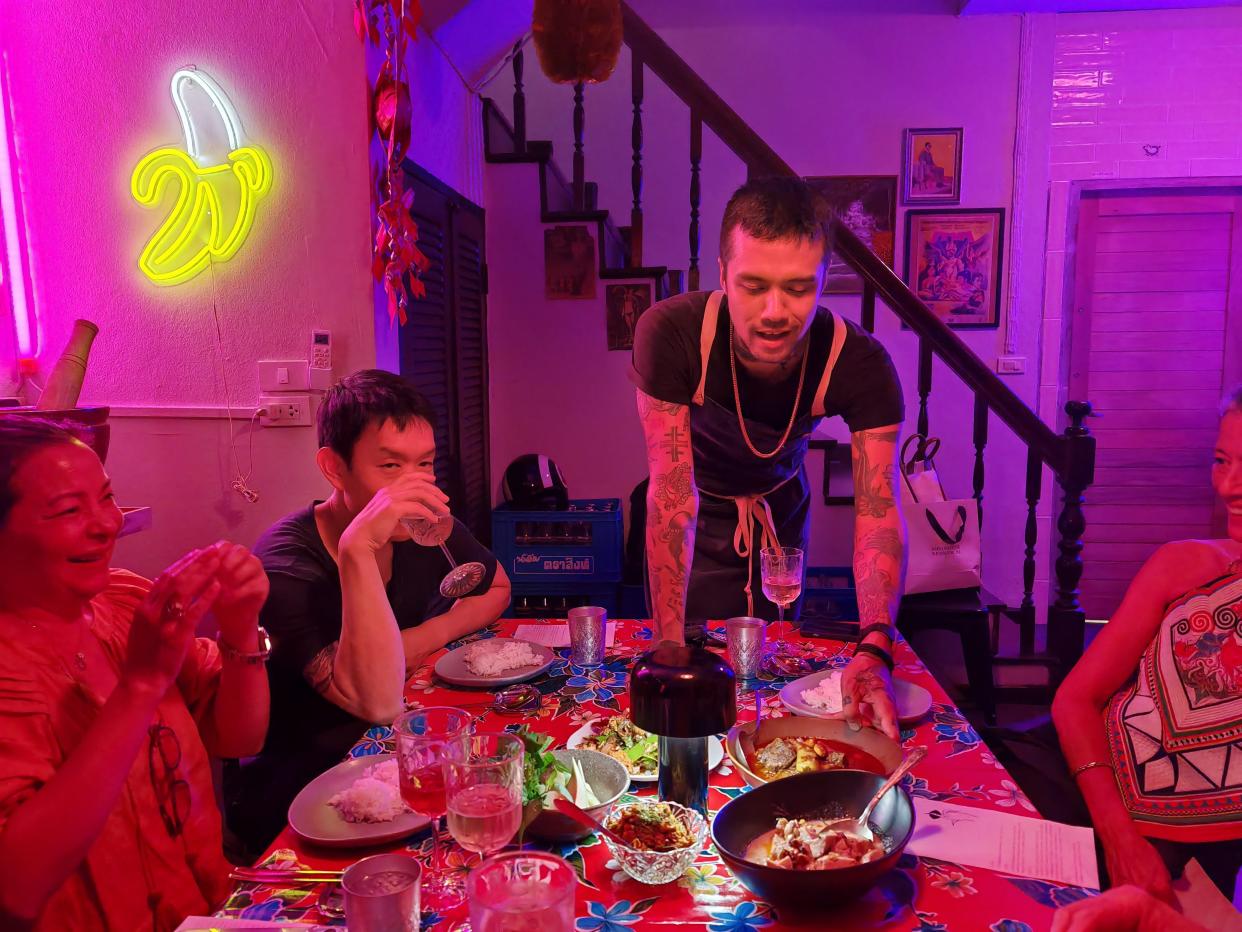
Thai-American millennial Dylan Eitharong started connecting to his roots by cooking Thai food in Orlando.
In 2019, he moved to Thailand to learn more and went on to open his supper club, Haawm.
Set up in his aunt's old townhouse, he charges $75 per head. It's become one of the hardest tables to book in Bangkok.
As a half-Thai, half-American kid growing up in Florida, Dylan Eitharong often felt out of place.
His father, a Thai immigrant, was focused on building a new life in the US and rarely taught him about Thai culture. But it was a comment his dad made while the family was eating out at a Chinese restaurant that sparked his curiosity about Thai cuisine.
"My dad told me this was 'real' Chinese food. It was different from the American Chinese takeout food. That made me think: If this is 'real' Chinese food, then is there 'real' Thai food too?" Eitharong told Business Insider.
His dad told him he'd have to figure out this for himself. "After that, I just fell into that wormhole, wanting to know what it was really like and what it tasted like," Eitharong said.
Eitharong, now 32, said the Thai restaurants he had grown up with in the US served things like green curry with bell peppers, and nothing was ever too spicy. He voraciously researched online and began cooking at home as a hobby.

His first journey to the Motherland
By the time he was enrolled in community college in Orlando, studying to be a teacher, he was also running a boat noodle pop-up at Swine & Sons, a Michelin-recognized restaurant in Florida. "After that, I felt like this cooking thing was kinda fun so I just dropped out of school," Eitharong said.
He went on to open his own pop-up, Bangrak Thai Street Kitchen, and expand his menu to serve street favorites such as khao soi (noodles with curry soup) and fried rice with fermented pork sausages.
Eitharong kept trying out new recipes but eventually concluded there was only so much he could learn in the US: "I had never been to Thailand before I was 23." After his first trip to Thailand, he continued to fly back and forth between Thailand and Florida every few months.
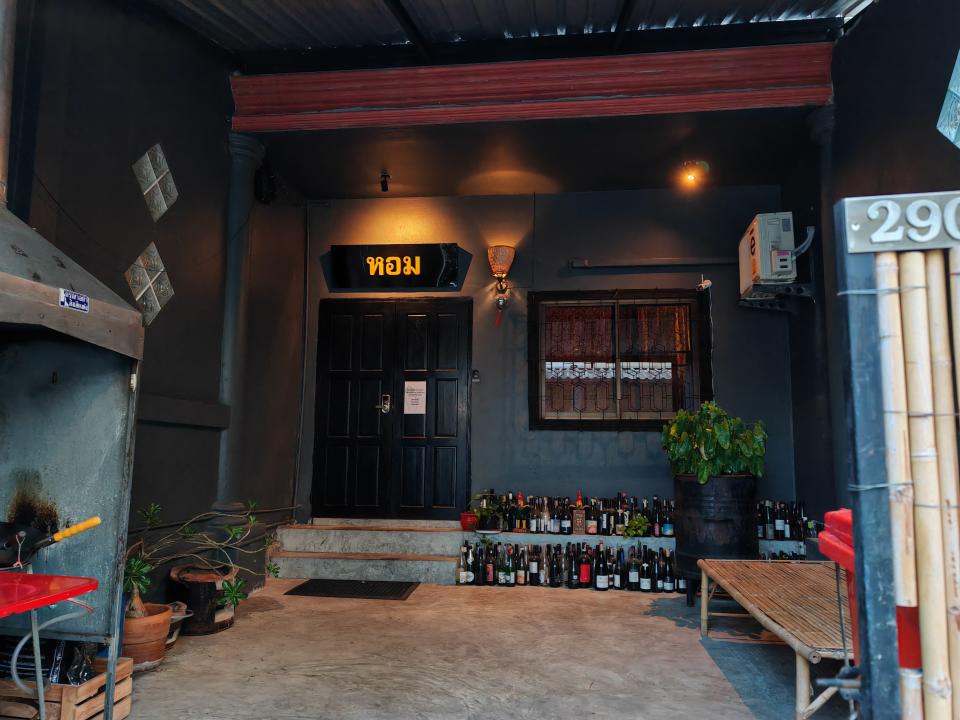
Thanks to Covid, Haawm was born
Eitharong took up Thai cooking masterclasses with a renowned food scholar, Hanuman Aspler, in Chiang Mai — a province in northern Thailand. Back in Bangkok, he worked as a chef at a contemporary Thai restaurant, before he moved on to set up his own pop-ups.
In 2019, he moved to Thailand. His goal was to continue learning more about Thai food. "In that first year, I wasn't getting the experience I wanted living in Thailand though, because Covid was happening," Eitharong said.
Forced to quarantine at his aunt's old townhouse deep in the residential Bangkok neighborhood of Onnut, he spent his free time teaching himself the language so he could read old Thai recipe books. During this time, he learned how to cook less common dishes and forge his own style of loud, maximalist flavors.
"It was curry that made it immediately click for me, that Thai food in Thailand doesn't taste like what you eat in America," he said. "In the US, curry was disgusting, and I hated eating it as a kid. It's a can of coconut milk and curry paste blown up together. If it's green curry, it's this beige color but here, it's delicious, complicated, and there's oil on top," he said. Curry became his main focus.
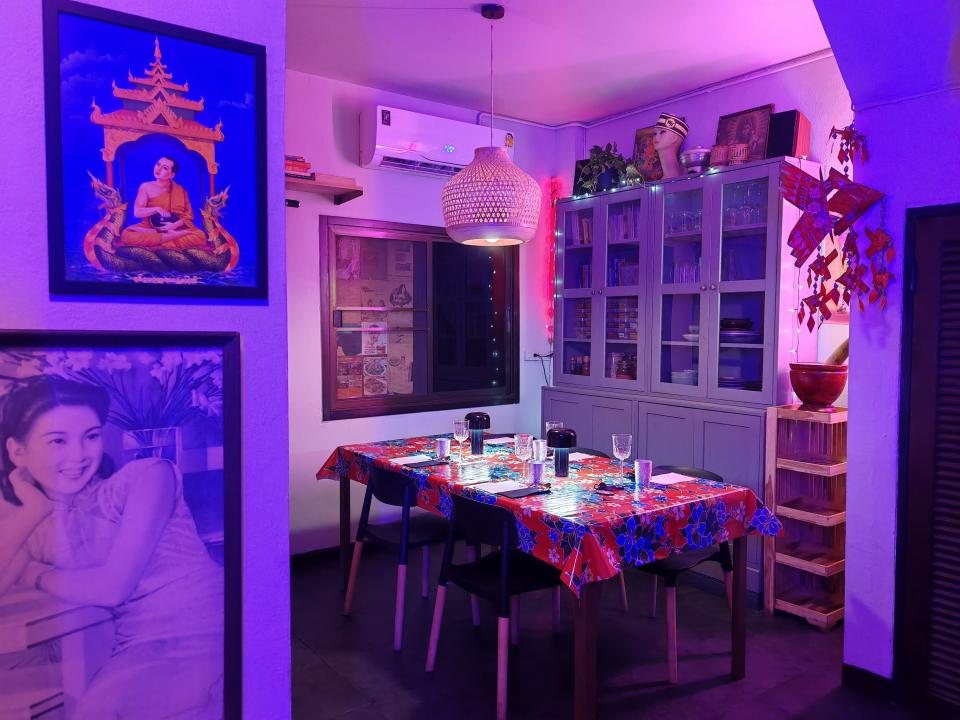
Casual but cool dining
Initially, his aunt had wanted him to run her renovated townhouse as an Airbnb. Instead, he converted the space into a private supper club and named it Haawm, which means "smells good" in Thai.
He invested 60,000 baht, or $1,639, to set up Haawm. Eitharong decked out the two rooms on the ground floor of the townhouse with pieces he picked up at Srinakarin Night Train Market — famously filled with antiques and vintage memorabilia.
Splashed in magenta and purple neon lights, the space is now decked out with vintage Thai posters, weave trays, a banana neon sign, and hot pink floral tablecloths.
Haawm's popularity in Bangkok spread through word of mouth and his inbox became flooded with people interested in the dining experience. He credits the pandemic for his supper club's success. "Without Covid, there would be no Haawm," said Eitharong. "People wanted to eat with their friends. This was the perfect set-up because they could eat and have fun with their friends but wouldn't be out in public. That's why it took off I think."
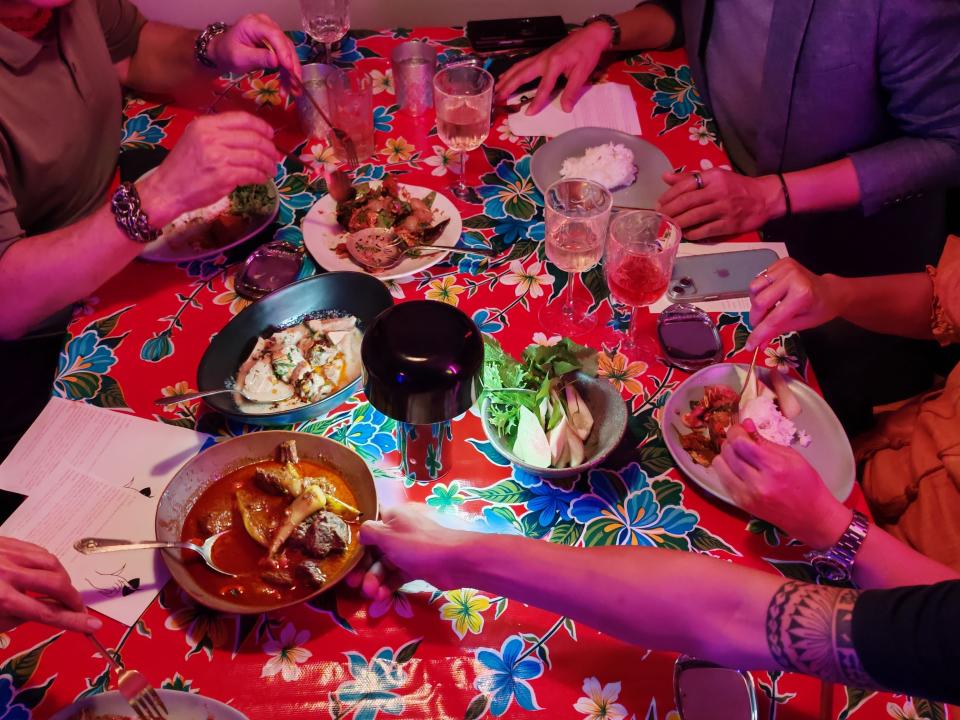
Upon arrival, diners are greeted with a playlist that bounces between Green Day and Randy Travis to Prince and Beyoncé. Two tables are set up that seat six to eight people each. Groups of six people can have the table to themselves, while lone diners are seated with others. As Haawm operates only Wednesday through Saturday, serving two rounds of diners each night, he said his bookings fill up months in advance.
A typical meal at Haawm starts with four snacks, before the six mains are served together to be shared. Two desserts round off the meal. No alcohol is sold, but diners can bring their own booze. The price fluctuates according to the menu, but it starts at 2,800 baht, or $77, per person.
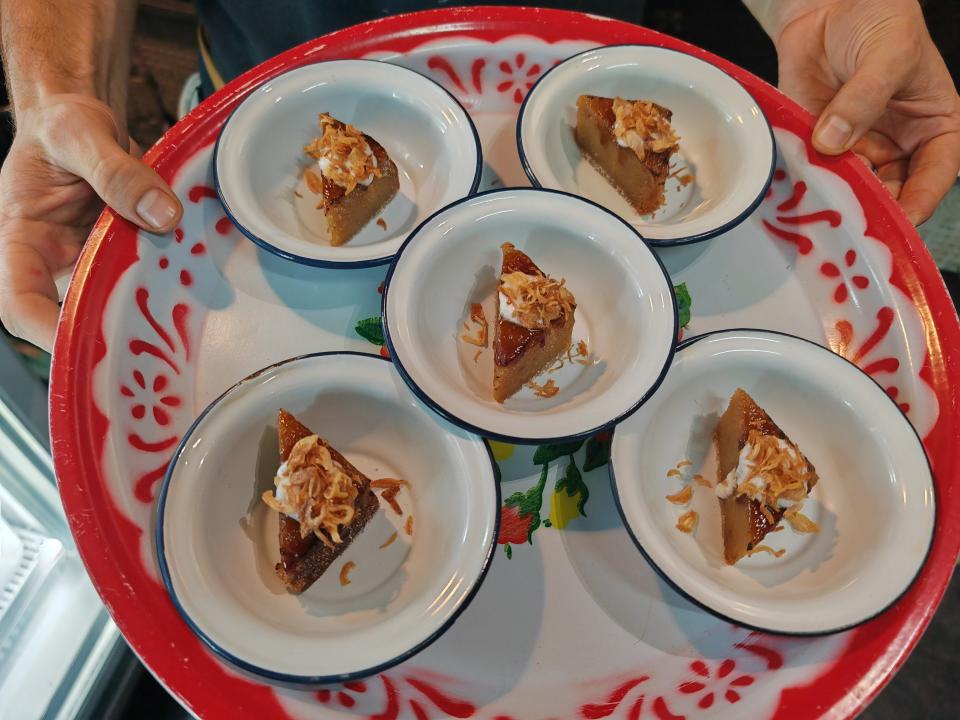
Despite Eitharong's culturally mixed upbringing, he sticks to authentic Thai food and never fusion. When I visited for BI, one snack, somewhat resembling a taco, was a spoonful of spicy duck laab (meat salad) served on a curved, deep-fried kratom leaf. A less familiar dish, jee juan beef curry, made an appearance as well. The chef made it a point to explain that it only differs slightly from the ever-popular massaman curry.
Eitharong's presence, too, was memorable. He's a badass chef with tattoos all over his arms and neck.

Winning over locals
Eitharong said his diners are a mix of tourists and Thai people. A few people have claimed he's not cooking Thai food because he's American. "I'm used to it, though. The ultimate approval for me is when moms and grandmas come here and love it," he said.
"For us, the Thai palate is still the most important one we want to please," he added.
Siradej Donavanik, 38, has been to Haawn six times. "When I tasted the first bite, it was just wow and all these explosions. My only gripe is how hard it is to book because sometimes Dylan will just decide he's off to America to cook for two weeks," he told BI.
Food and travel writer Vincent Vichit-Vadakan told BI he appreciates how Eitharong has switched up the local food scene. "He doesn't feel bound by the rules of classic culinary school techniques or the weight of Thai tradition," Vichit-Vadakan said of the chef. "And that is a breath of fresh air in Bangkok."
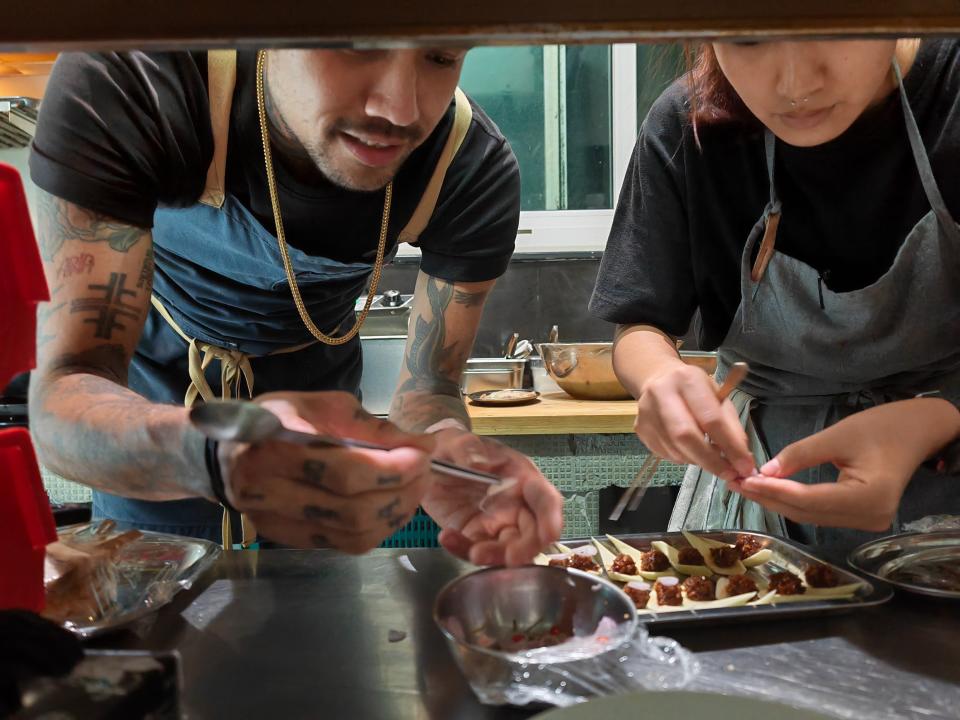
Small but easy to manage
Long past the days of having to be the chef, waiter, and host all in one, Eitharong now hires three staffers to help run Haawm. He's made back his investment, but credits that to having to pay his aunt an affordable monthly 12,000 baht for rent.
He said the plus side of running a supper club is the predictability, as you don't have to worry about rainy days when no diners will show up. He can plan ahead when it comes to both ingredients and staff. "That way you're not throwing blindly in the wind," he said.
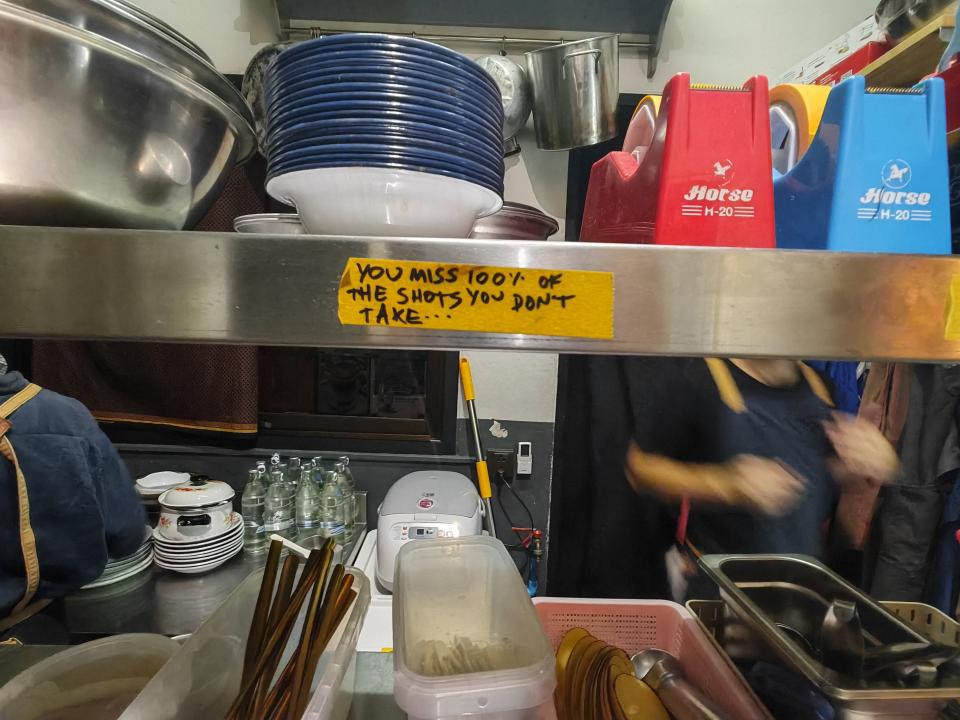
He said his biggest expenses are building maintenance and his staff's salaries.
With a monthslong waiting list still going strong, Eitharong is looking to expand and upgrade Haawm. He hopes to be open for more nights and remodel the kitchen in the future.
"In a post-Covid world, the small, intimate dining experience works better for chefs," Eitharong said. "There's a whole culture of overworking that comes with food. I don't think that needs to be necessary, and I'd like to stick with that. I didn't think Haawm would take off like it did and I didn't think I'd still be doing it now."
Read the original article on Business Insider


